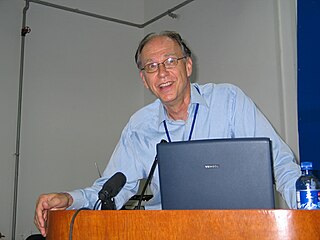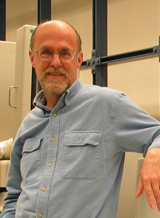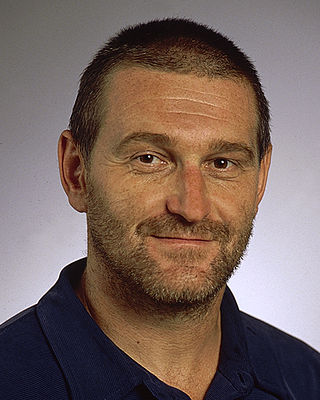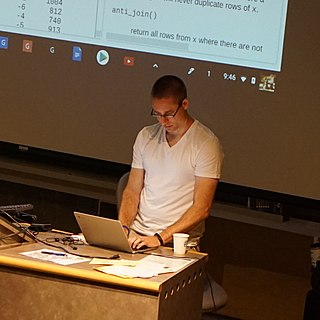Related Research Articles

Steven Lloyd Salzberg is an American computational biologist and computer scientist who is a Bloomberg Distinguished Professor of Biomedical Engineering, Computer Science, and Biostatistics at Johns Hopkins University, where he is also Director of the Center for Computational Biology.

Michael Spencer Waterman is a Professor of Biology, Mathematics and Computer Science at the University of Southern California (USC), where he holds an Endowed Associates Chair in Biological Sciences, Mathematics and Computer Science. He previously held positions at Los Alamos National Laboratory and Idaho State University.

Webb Colby Miller is an American bioinformatician who is professor in the Department of Biology and the Department of Computer Science and Engineering at The Pennsylvania State University.
MUMmer is a bioinformatics software system for sequence alignment. It is based on the suffix tree data structure and is considered by some to be one of the faster and most efficient systems available for this task, enabling it to be applied to very long sequences. It has been widely used for comparing different genomes to one another. In recent years, it has become a popular algorithm for comparing genome assemblies to one another, which allows scientists to determine how a genome has changed after adding more DNA sequence or after running a different genome assembly program. The acronym "MUMmer" comes from "Maximal Unique Matches", or MUMs. The original algorithms in the MUMMER software package were designed by Art Delcher, Simon Kasif and Steven Salzberg. Mummer was the first whole genome comparison system developed in Bioinformatics. It was originally applied to the comparison of two related strains of bacteria.

Robert Clifford Gentleman is a Canadian statistician and bioinformatician who is currently the founding executive director of the Center for Computational Biomedicine at Harvard Medical School. He was previously the vice president of computational biology at 23andMe. Gentleman is recognized, along with Ross Ihaka, as one of the originators of the R programming language and the Bioconductor project.

The Benjamin Franklin Award is an annual award for Open Access in the Life Sciences presented by Bioinformatics.org to an individual who has, in his or her practice, promoted free and open access to the materials and methods used in the life sciences.

Pavel Arkadevich Pevzner is the Ronald R. Taylor Professor of Computer Science and director of the NIH Center for Computational Mass Spectrometry at University of California, San Diego. He serves on the editorial board of PLoS Computational Biology and he is a member of the Genome Institute of Singapore scientific advisory board.

Tandy Warnow is an American computer scientist and Grainger Distinguished Chair in Engineering at the University of Illinois at Urbana–Champaign. She is known for her work on the reconstruction of evolutionary trees, both in biology and in historical linguistics, and also for multiple sequence alignment methods.

David Sankoff is a Canadian mathematician, bioinformatician, computer scientist and linguist. He holds the Canada Research Chair in Mathematical Genomics in the Mathematics and Statistics Department at the University of Ottawa, and is cross-appointed to the Biology Department and the School of Information Technology and Engineering. He was founding editor of the scientific journal Language Variation and Change (Cambridge) and serves on the editorial boards of a number of bioinformatics, computational biology and linguistics journals. Sankoff is best known for his pioneering contributions in computational linguistics and computational genomics. He is considered to be one of the founders of bioinformatics. In particular, he had a key role in introducing dynamic programming for sequence alignment and other problems in computational biology. In Pavel Pevzner's words, "[ Michael Waterman ] and David Sankoff are responsible for transforming bioinformatics from a ‘stamp collection' of ill-defined problems into a rigorous discipline with important biological applications."
Bowtie is a software package commonly used for sequence alignment and sequence analysis in bioinformatics. The source code for the package is distributed freely and compiled binaries are available for Linux, macOS and Windows platforms. As of 2017, the Genome Biology paper describing the original Bowtie method has been cited more than 11,000 times. Bowtie is open-source software and is currently maintained by Johns Hopkins University.

Desmond Gerard Higgins is a Professor of Bioinformatics at University College Dublin, widely known for CLUSTAL, a series of computer programs for performing multiple sequence alignment. According to Nature, Higgins' papers describing CLUSTAL are among the top ten most highly cited scientific papers of all time.

Lior Samuel Pachter is a computational biologist. He works at the California Institute of Technology, where he is the Bren Professor of Computational Biology. He has widely varied research interests including genomics, combinatorics, computational geometry, machine learning, scientific computing, and statistics.
TopHat is an open-source bioinformatics tool for the throughput alignment of shotgun cDNA sequencing reads generated by transcriptomics technologies using Bowtie first and then mapping to a reference genome to discover RNA splice sites de novo. TopHat aligns RNA-Seq reads to mammalian-sized genomes.

Rafael Irizarry is a professor of biostatistics at the Harvard T.H. Chan School of Public Health and professor of biostatistics and computational biology at the Dana–Farber Cancer Institute. Irizarry is known as one of the founders of the Bioconductor project.
Minoru Kanehisa is a Japanese bioinformatician. He is a project professor at Kyoto University, technical director of Pathway Solutions Inc and president of NPO Bioinformatics Japan. He is one of Japan's most recognized and respected bioinformatics experts and is known for developing the KEGG bioinformatics database.
Owen R. White is a bioinformatician and director of the Institute For Genome Sciences at the University of Maryland School of Medicine. He is known for his work on the bioinformatics tools GLIMMER and MUMmer.

Srinivas Aluru is a professor in the School of Computational Science and Engineering at Georgia Institute of Technology, and co-Executive Director for the Georgia Tech Interdisciplinary Research Institute in Data Engineering and Science. His main areas of research are high performance computing, data science, bioinformatics and systems biology, combinatorial methods in scientific computing, and string algorithms. Aluru is a Fellow of the American Association for the Advancement of Science (AAAS) and the Institute for Electrical and Electronic Engineers (IEEE). He is best known for his research contributions in parallel algorithms and applications, interdisciplinary research in bioinformatics and computational biology, and particularly the intersection of these two fields.

Jeffrey Tullis Leek is an American biostatistician and data scientist working as a Vice President, Chief Data Officer, and Professor at Fred Hutchinson Cancer Research Center. He is an author of the Simply Statistics blog, and runs several online courses through Coursera, as part of their Data Science Specialization. His most popular course is The Data Scientist's Toolbox, which he instructed along with Roger Peng and Brian Caffo. Leek is best known for his contributions to genomic data analysis and critical view of research and the accuracy of popular statistical methods.

Bruce Colston Trapnell Jr. is an assistant professor in the Department of Genome Sciences at the University of Washington. He was awarded the Overton Prize by the International Society for Computational Biology (ISCB) for “outstanding accomplishment in the early to mid stage of his career” in 2018.
References
- ↑ "Benjamin Langmead - Department of Computer Science". Department of Computer Science. Retrieved 23 March 2017.
- ↑ Ben Langmead publications indexed by Google Scholar
- 1 2 "Langmead CV" (PDF). Retrieved 24 March 2017.
- ↑ Langmead, Ben; Trapnell, Cole; Pop, Mihai; Salzberg, Steven L (2009). "Ultrafast and memory-efficient alignment of short DNA sequences to the human genome". Genome Biology. 10 (3): R25. doi: 10.1186/gb-2009-10-3-r25 . PMC 2690996 . PMID 19261174.
- ↑ "Benjamin Franklin Award - Bioinformatics.org". www.bioinformatics.org. Retrieved 23 March 2017.